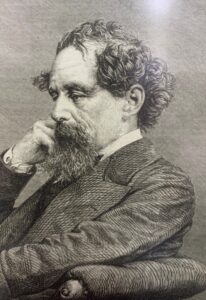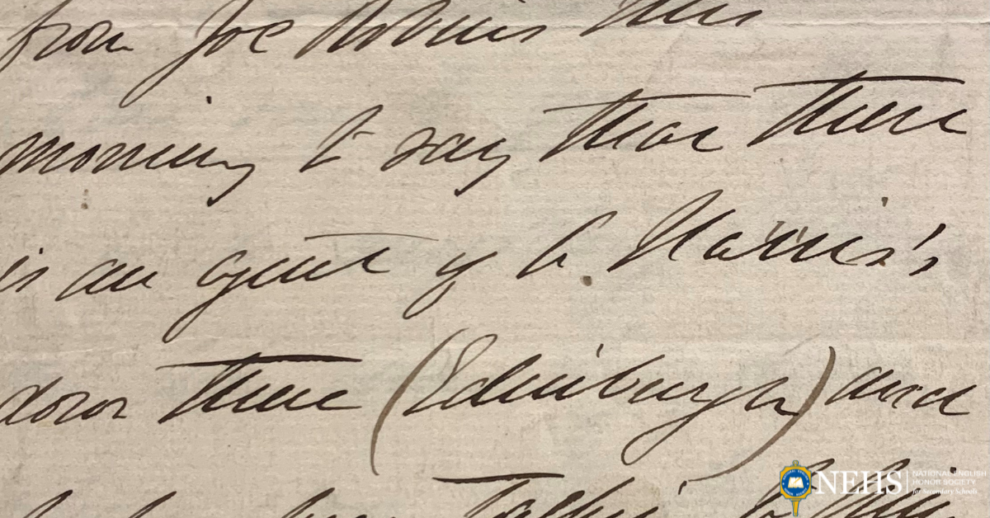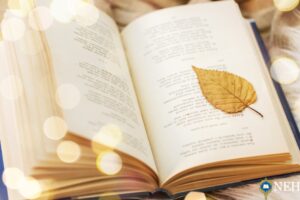I have had a fascination for collecting old British literary documents for many years now. It really started some twenty years ago when, within a Masters degree called Victorian Studies, I took a module on novelist and journalist Charles Dickens (1812-1870) at the University of London.
Creating the collection has been for my own pleasure as well as, now, for the use of our new NEHS students and chapter at The Wingate School in Mexico City.
To think that we can handle documents that were penned some two hundred years ago, and, in their texts, even witness the triumphs and failures of major literary figures like Dickens, or his close friends (also distinguished authors) John Forster, Douglas Jerrold, and Wilkie Collins, is an amazing thing. In his day, Dickens was considered a superstar in the literary firmament. Not a particularly modest man, it also is clear he knew it!
The Thrill of the Hunt

Acquiring old letters and documents often involves much hunting. In turn, that process is a real thrill, as though you are solving a mystery story. Sometimes, though, once a particular object is located, the high asking price then means you just have to let it go! A bitter-sweet moment, believe me.
Our school collection now contains some five hundred original items, with about one hundred of those related to the life and death of the aforesaid Dickens. I have acquired only a handful of items actually written by him, owing to their scarcity and cost.
Find Out Something New
However, it always is a good idea (and far cheaper) to seek out items that make direct references to Dickens. Much biographical minutiae can be learned that way, too. Occasionally, and an extra fascination, details are revealed that have not appeared even in the best biographies. Here are three Dickensian examples I can cite.
- The school’s collection reveals a rumor that, in the late 1860s, the great man was running out of money, leading to his ill-fated reading tour in the USA.
- Jerrold, who predeceased Dickens by many years, tells a correspondent how much he owes to his great friend for his especially kind moral support.
- For his part, two letters from Forster, a somewhat pompous lawyer and Dickens’s first biographer, sent to the Rev. W. Elwin (also a magazine editor), dated June and July 1870, show how devastated Forster was by the recent loss of his very best friend, and how much solace he now required from this sympathetic clergyman.
There are many more such examples.
Create Your Unique Collection
Why not start your own collection of literary documents for your chapter? If the cost of obtaining original letters seems to be an impediment, I recommend you start by getting hold of bound volumes of British or American Victorian newspapers. Usually relatively inexpensive, they always are packed with news and engraved illustrations, and, before long, you definitely will come across references—via things like obituaries and critiques of new works—that will greatly add to your knowledge of your own literary heroes and their works. Happy hunting!
 Tom M J Wingate
Tom M J Wingate
The Marshalsea Chapter, Advisor
The Wingate School, Mexico City
National English Honor Society
The National English Honor Society (NEHS), founded and sponsored by Sigma Tau Delta, is the only international organization exclusively for secondary students and faculty who, in the field of English, merit special note for past and current accomplishments. Individual secondary schools are invited to petition for a local chapter, through which individuals may be inducted into Society membership. Immediate benefits of affiliation include academic recognition, scholarship and award eligibility, and opportunities for networking with others who share enthusiasm for, and accomplishment in, the language arts.
America’s first honor society was founded in 1776, but high school students didn’t have access to such organizations for another 150 years. Since then, high school honor societies have been developed in leadership, drama, journalism, French, Spanish, mathematics, the sciences, and in various other fields, but not in English. In 2005, National English Honor Society launched and has been growing steadily since, becoming one of the largest academic societies for secondary schools.
As Joyce Carol Oates writes, “This is the time for which we have been waiting.” Or perhaps it was Shakespeare: “Now is the winter of our discontent made glorious summer . . .” we celebrate English studies through NEHS.
National English Honor Society accepts submissions to our blog, NEHS Museletter, from all membership categories (students, Advisors, and alumni). If you are interested in submitting a blog, please read the Suggested Guidelines on our website. Email any questions and all submissions to: submit@nehsmuseletter.us.





